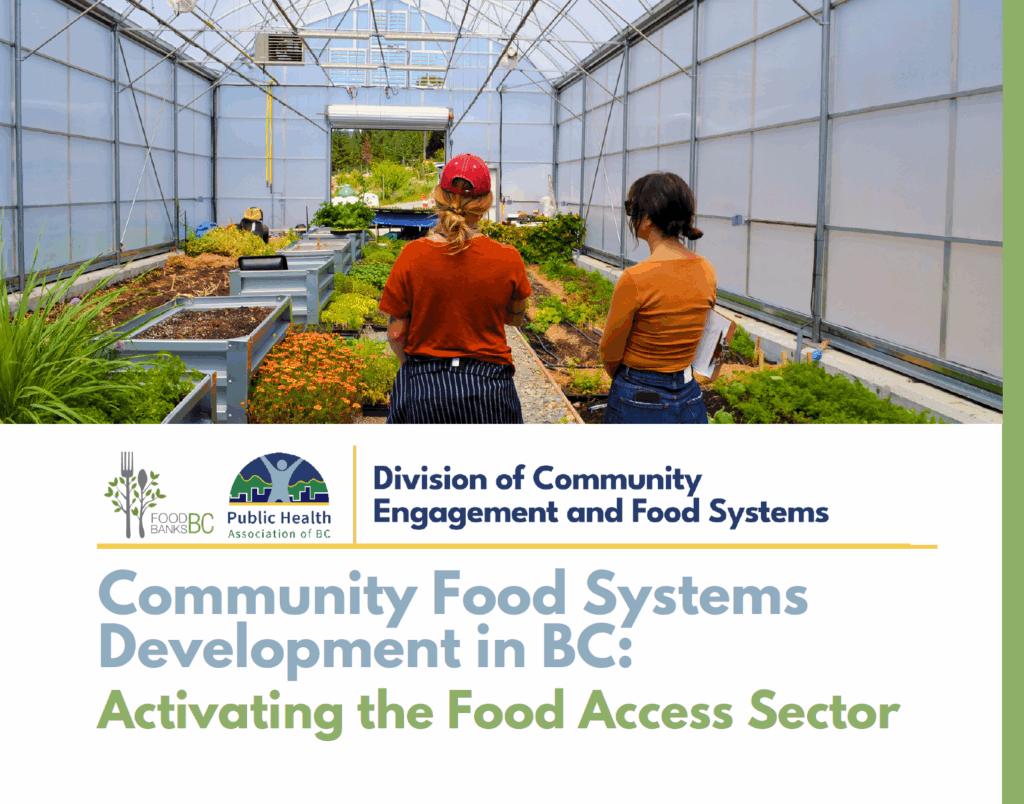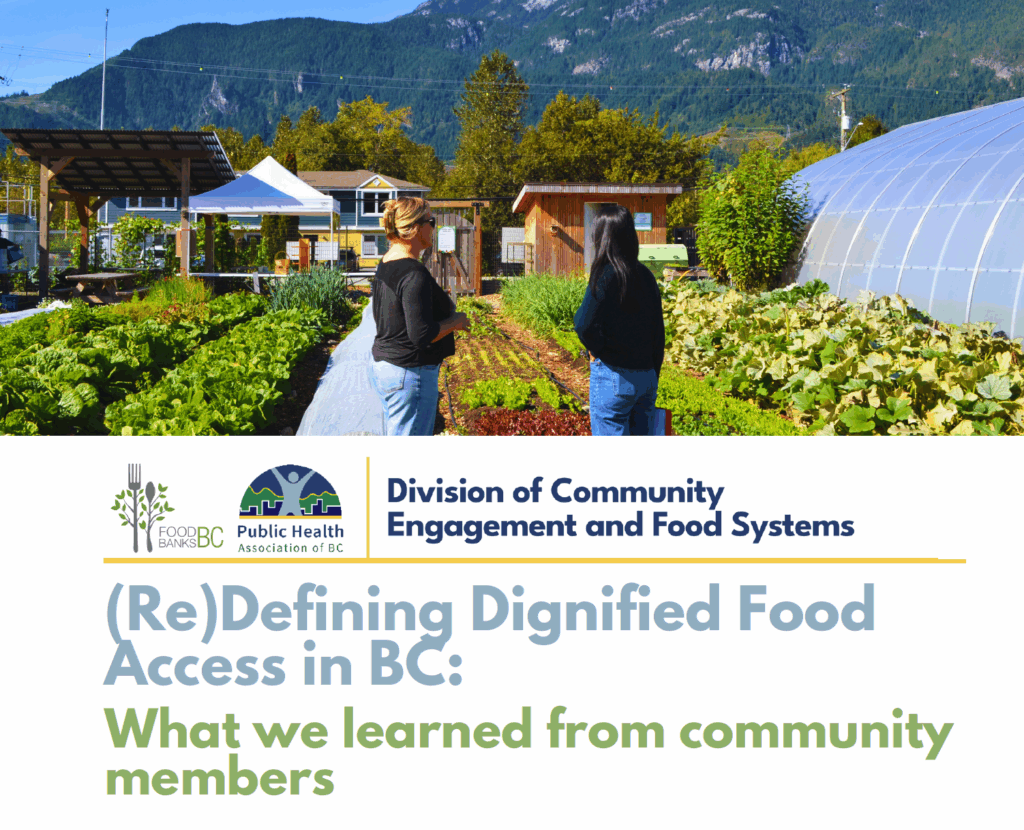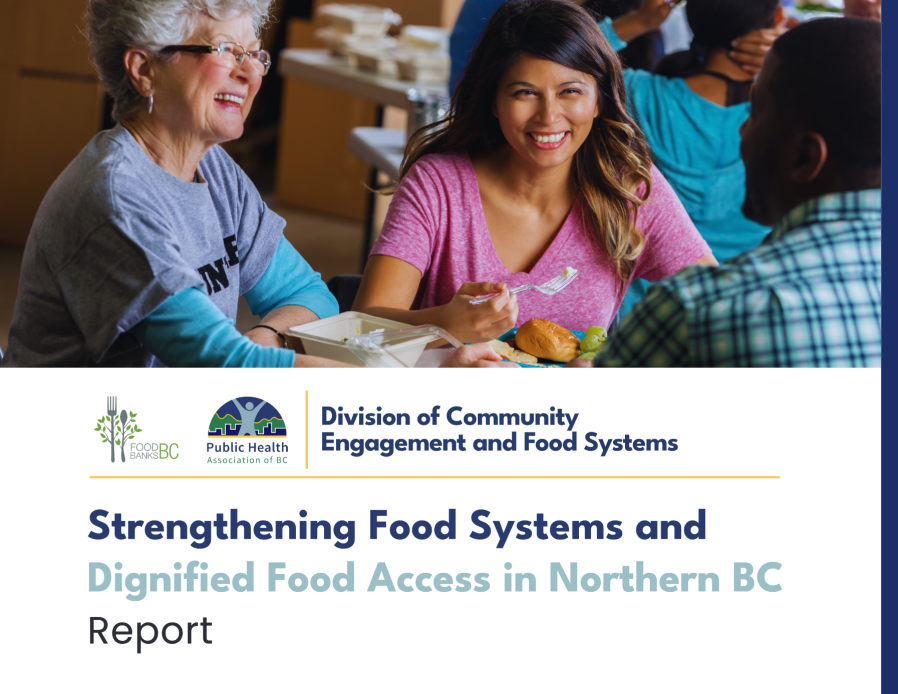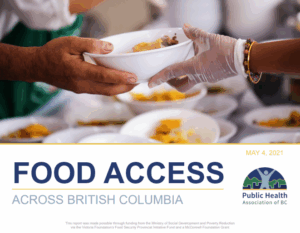PHABC’s division of community engagement and food systems (CEFS) works alongside many partners to develop and provide resources, reports and systems transformation. Below is a collection of some of our resources.
Community Food Systems Development in BC: Activating the Food Access Sector

We are deeply grateful to the Ministry of Social Development and Poverty Reduction for their commitment to exploring effective solutions to food security challenges in BC.
The “Community Food Systems Development in BC: Activating the Food Access Sector” report explores the diverse ways in which food access organizations in British Columbia (BC) are addressing immediate hunger and building capacity across the food access landscape to foster local food systems transformation.
This project identified that British Columbia’s unique geography, diverse populations, varying climates and different community conditions foster distinct advantages and specific hurdles in developing equitable and dignified food systems.
The intelligence gathered in this report will support program redesign, strengthen systemic responsiveness and ensure that the voices on the front line are heard. Most of effective problem solving is achieved in partnership and in true understanding of the solutions the community has already imagined.
(Re)Defining Dignified Food Access in BC: What we learned from community members

We would like express our sincere gratitude to the Ministry of Social Development and Poverty Reduction for its commitment to improving the lives of British Columbians experiencing food insecurity.
This report delves into the concept of dignified food access in British Columbia, exploring how various food access organizations are working to create welcoming, respectful, and inclusive environments. The study highlights the importance of quality food choices, community connections, and advocacy in addressing food insecurity and promoting long-term food self-sufficiency.
This investigation goes to the heart of effective food programming. It brings forward the stories of numerous population groups whose voices must be centered in this work. Throughout this report, we have embedded the voices of community members. We hope we have honored their concerns and highlighted the solutions that work from their perspectives. This work is essential to building more responsive, equitable, and transformative food systems.
Strengthening Food Systems and Dignified Food Access in Northern BC Report

Funding for this project was informed from the Resilient North Research Project (funded by BC-SDPR in 2022) which deepened our understanding of the unique food-security challenges northern communities face, especially rural, remote and Indigenous communities.
Access to nutritious, safe, and culturally appropriate food is essential for the well-being and dignity of every individual. Over the past several years, food insecurity in British Columbia has risen, exacerbated by global events like the COVID-19 pandemic, climate emergencies, and the rising cost of living. Consequently, BC food bank visits increased by 57% from 2019 to 2023, a figure that is even higher in rural communities at 101% (Food Banks Canada, 2023). Northern BC in particular faces distinct challenges and barriers to reliable and sustainable food access, driven by its small population, vast geography, and limited infrastructure. As a result, food banks in the region have experienced a disproportionately high demand for services.
Recognizing the need for a northern-specific response to address the inequitable access to food in the region, Food Banks BC (FBBC) and the Public Health Association of BC (PHABC) initiated the Strengthening Food Systems and Dignified Food Access in Northern BC project in 2022. Funded by the Ministry of Social Development and Poverty Reduction, this project aims to explore the opportunities, strengths, barriers, and challenges related to food access in northern BC. This knowledge can inform and support efforts to enhance food system resilience across the region.
Meaningful Youth Volunteerism in Surrey Food Systems
PH ABC has been investigating evidence from around the globe, contributing to the mental wellbeing of children and youth. A discovery dialogue about how this evidence applies in the British Columbia context was conducted and while social isolation was always a factor it has been exacerbated by the COVID-19 pandemic. PHABC’s Best Brains Exchange forum and health authority networking dialogues conducted with funding from the Pacific Foundation for Public Health, highlight the importance of youth engagement, including volunteering, as crucial for enhancing youth mental wellbeing and empowerment.
ABC has been investigating evidence from around the globe, contributing to the mental wellbeing of children and youth. A discovery dialogue about how this evidence applies in the British Columbia context was conducted and while social isolation was always a factor it has been exacerbated by the COVID-19 pandemic. PHABC’s Best Brains Exchange forum and health authority networking dialogues conducted with funding from the Pacific Foundation for Public Health, highlight the importance of youth engagement, including volunteering, as crucial for enhancing youth mental wellbeing and empowerment.
Youth from equity-seeking groups may encounter challenges accessing formal volunteer placements, facing different experiences compared to non-equity-seeking groups. Determinants such as housing, education, income, the built environment, and social inclusion are perceived barriers.
Our project focused on understanding the challenges and opportunities for underserved youth in Surrey. The mixed methods approach taken for this investigation included, a survey, targeted focus groups and support from partner organizations to reach eligible youth. Participant numbers were modest, despite employing a range of communication strategies and incentives. Even so, these early findings are compelling, and more extensive studies with larger sample sizes are needed post-COVID-19 to more fully understand youth perspectives and experiences with volunteering from the margins.
This report contributes to our ongoing mission to understand, protect, and support youth in our changing society. Findings and recommendations align with our broader investigation into youth engagement and participation.
Understanding Local Food Culture in the Prince George, B.C. Area
 Access to food and local food resources are at the forefront of issues facing British Columbians. During uncertain times where residents are faced with the rising costs associated with inflation and the uncertainty of food supply from historical disasters such as the Covid-19 pandemic, flooding, and forest fires, the need to understand local food systems has become increasingly important. This study sought to further understand the gaps in local food access and education.
Access to food and local food resources are at the forefront of issues facing British Columbians. During uncertain times where residents are faced with the rising costs associated with inflation and the uncertainty of food supply from historical disasters such as the Covid-19 pandemic, flooding, and forest fires, the need to understand local food systems has become increasingly important. This study sought to further understand the gaps in local food access and education.
The College of New Caledonia (CNC) recognizes the challenges around accessing local food. In partnership with the Public Health Association of BC (PHABC), the Applied Research and Innovation department at CNC aimed to research potential solutions to local food access and education. This project idea is an extension of CNC’s successful 2023 Feed BC Grant project “It Takes a Community to Feed a Student” which sought to understand student food security within their perspective campuses, and specifically if there was access to local foods within CNC and the University of Northern British Columbia.
With a 2024 grant from the Feed BC Post Secondary Institution Partner Capacity Funding, CNC distributed a survey to understand local food access and limitations on a community scale. The survey also sought to understand types of educational opportunities around local food those surveyed would be interested in; using the Feed BC Funding, CNC then hosted a free, half day workshop on a topic that community members expressed most interest in.
The Role of Food System Planning in Facilitating Local Food Procurement for School Meals
 Farm to School (F2S) programs seeks to connect students with their local food system and community. Providing local food to schools, however, relies on the continuity of local food production in British Columbia (B.C.), as well as the capacity and willingness of farmers to support this “alternative market.”
Farm to School (F2S) programs seeks to connect students with their local food system and community. Providing local food to schools, however, relies on the continuity of local food production in British Columbia (B.C.), as well as the capacity and willingness of farmers to support this “alternative market.”
Planners have an important role to play in supporting farmers’ ability to sustain local food systems. At the provincial level, planning for farmland preservation through the Agricultural Land Reserve has helped to secure some of the farmland needed to support local food production into the future.
However, preserving farmland is only one part of the solution to sustain local food systems. Drawing upon key informant interviews (n=21), this paper identifies planning-related barriers and opportunities for local food procurement in schools. This research emphasizes the invaluable roles that farmers, government, and planners can play in reimagining a just and sustainable food system transition.
Blomley, E., Soma, T., Callihoo, C., Han, R., Páez-Varas, C., Bodnar, C., & Li, B. (2023). The Role of Food System Planning in Facilitating Local Food Procurement for School Meals. Canadian Planning and Policy Aménagement Et Politique Au Canada, 2023(1), 133–159. https://doi.org/10.24908/cpp-apc.v2023i1.16561
Food Access in Surrey BC Report
![]() In 2021, the Public Health Association of BC (PHABC) received funding from the First West Foundation to conduct a case study with the Seeds of Change Surrey (SOCS) network. The study focused on the experiences of clients using food programs provided by Social Assistance Organizations (SAOs) in Surrey.
In 2021, the Public Health Association of BC (PHABC) received funding from the First West Foundation to conduct a case study with the Seeds of Change Surrey (SOCS) network. The study focused on the experiences of clients using food programs provided by Social Assistance Organizations (SAOs) in Surrey.
Participants generally reported positive interactions with SAO staff and volunteers. However, they faced challenges such as the limited ability to choose food options and quantities, and issues with dietary restrictions and food quality. Key recommendations from the study include the need for a universal basic income, improved food access models that offer dignity and choice, and greater involvement of diverse voices in decision-making processes.
From a public health perspective, these findings highlight the critical need for food systems that support nutritional health and social well-being. Addressing food insecurity through inclusive and equitable models can reduce health disparities, improve mental and physical health outcomes, and foster community resilience. The study emphasizes the importance of transitioning towards more dignified and inclusive food access systems to better serve Surrey’s diverse community and improve overall public health.
Food Access Across British Columbia
This report provides an overview of 168 food access organizations across the province, offering a snapshot of how community-based programs support residents in meeting basic food needs. It highlights the diversity of services—from food hampers to hot meals to community kitchens—and shows how organizations differ widely in capacity, staffing, and program models.
The findings point to significant regional variation, with rural, remote, and Indigenous-serving communities facing unique challenges that require tailored approaches. The report also reflects on how the COVID-19 pandemic shifted demand and service delivery, underscoring the essential role these organizations play in BC’s social safety net.
Recommendations emphasize the need for sustained funding, adequate staffing, improved data collection, and stronger networks across the sector. Together, these insights provide valuable context for strengthening dignified, community-driven food access across the province.




